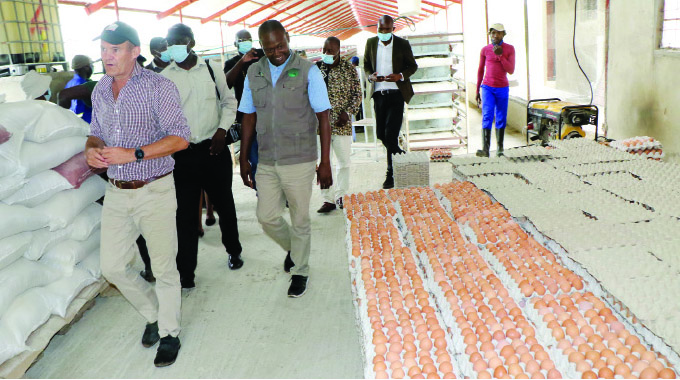Rural Nathisa enjoys industrial revolution

Nqobile Tshili, Chronicle Reporter
A RURAL industrial revolution is underway in Nathisa, Matobo District in Matabeleland South, where a local commercial farmer has contracted communities in an out-grower project which has improved livelihoods.
Government adopted the Agriculture and Food System Transformation Strategy in a bid to alleviate poverty and address food insecurity.

Mr Peter Cunningham takes Deputy Minister of Lands, Agriculture, Fisheries, Water and Rural Development Douglas Kororo on a tour of farming projects at Maleme Farm in Matopo yesterday. (Pictures by Obey Sibanda)
The strategy also entails uplifting rural communities through horticulture projects and President Mnangagwa on Wednesday launched the Presidential Rural Development Scheme to accelerate poverty alleviation in rural areas.
Nathisa villagers and surrounding communities have already moved a step further in line with the national vision as villagers have shifted from mud and thatch homes to modern houses that are solar equipped.
This is as a result of a number of income-generating projects that are being undertaken in the area to end rural poverty.
The projects are being done in partnership with local commercial farmer Mr Peter Cunningham of Maleme Farm.
A farming training school targeting young people and offering two-year courses, capacitates them to treat agriculture as a business and increase yields in the village.
Ostrich, horticulture, poultry, and cattle rearing are some of the projects in Nathisa.
Under the out-grower scheme, villagers are given chicks and stockfeed and when the chickens are fully developed, Mr Cunningham buys from them leaving them to reap profits.
One of the beneficiaries of the scheme, Ms Momet Ncube said she realises $80 000 from chicken rearing every six weeks.
“I used to struggle to send my children to school but now my life is totally transformed.
I know that in just six weeks I would have made $80 000 from chicken rearing.
I have been able to build two modern houses and I recently destroyed another mud and thatch house and will be constructing another modern one. I have managed to do all this through the poultry project that we are doing,” said Ms Ncube.
She was speaking during the tour of Maleme Farm yesterday by Deputy Minister of Lands, Agriculture, Water, Climate and Rural Development Douglas Kororo.
Prior to touring Maleme Farm, the deputy minister made a brief stop-over at Ms Ncube’s homestead. She explained to the deputy minister and other officials how beneficial it has been to be part of the out-grower scheme.
Mr Cunningham took the deputy minister through his expansive projects that cut from poultry, dairy, horticulture and ostrich farming, while also explaining how his agriculture school is contributing to the country’s agricultural revolution.
Deputy Minister Kororo was so charmed by the farming enterprise to the extent that he said he would convince President Mnangagwa to visit the area as he believes that what is happening in Nathisa could shape the agricultural sector.
“I felt like I cannot be seeing this alone.
The President is doing a lot and I’m sure that if he comes here, it will also inspire a lot of our farmers.
Because when the President comes here, he is going to make some pronouncements on policy changes in the agriculture sector,” said Deputy Minister Kororo.
He said of significance is that Mr Cunningham was empowering surrounding communities.
“The kind of model that I saw here is so inspiring. We have seen that at this farm they are also training young farmers.
The course is for two years where the youths are given options.
They first have to go into horticulture, poultry, and cattle rearing and after the two years, they then decide on what they want to settle for.
So, this is a model that we can follow as a country,” he said.
“The kind of training that is being done here is meant to project farming or agriculture as a business and that is exactly what our ministry’s Rural Development Accelerator model is all about.
The out-grower programme is also in sync with what the President officially launched yesterday.
The problem was mainly marketing and from this model that we have seen today, farmers are given chicks that they grow and sell back to the farmer, Mr Cunningham.”
He said the programme can absorb a lot of youths who are not productive at the moment.
Mr Cunningham said agriculture is an enabling vehicle towards achieving Vision 2030.
“Zimbabwe has got a very powerful vision of creating a middle-income economy by 2030 and also reversing the rural urban drift.
It can help rural areas not just to be self-sustainable but productive. I think that it is good to see that there are initiatives, companies and people who are already behind Vision 2030 through mobilising the young people to be part of that, to use their energy to be part of that,” said Mr Cunningham.
He said training youths in agriculture is part of a broader vision to capacitate them as they are the ones who will change the country’s development trajectory.
Mr Cunningham said young people should start seeing agriculture as a business considering the opportunities that exist in the sector.
“Most youths don’t see agriculture as a form of income and a business, they want to go to towns and work in offices.
We need to get agriculture moving, which is going to need the young people to take over.
I think it is very significant that they see the productive potential and how that links with unlocking the next generation,” he said.
Primary and Secondary Education Deputy Minister Edgar Moyo, who is Matobo North MP, said if the projects done at Nathisa are replicated in other communities, the country is can achieve an upper middle-income economy by 2030.
“In this area, the children were known for not going to school.
They would go up to Grade 7 and the parents would claim that they don’t have money to further their education.
These out-grower projects and employment that is created through this enterprise has enabled the villagers to be able to take their children to school; they have managed to transform their homes from mud and thatch to modern homes,” said Deputy Minister Moyo.
“If you look around, almost every home has got a solar system for lighting, charging their phones and some of them have television sets.
So, the standard of living is going up.
What we have said is that Vision 2030 is not a destination, it is a journey that we must be walking and we need to take steps towards achieving it without expecting anyone to come and do it for us.” — @nqotshili








Comments